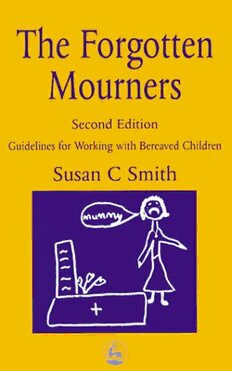Download The forgotten mourners: guidelines for working with bereaved children PDF Free - Full Version
Download The forgotten mourners: guidelines for working with bereaved children by Susan C. Smith in PDF format completely FREE. No registration required, no payment needed. Get instant access to this valuable resource on PDFdrive.to!
About The forgotten mourners: guidelines for working with bereaved children
In this second edition, Susan Smith raises awareness of the sensitive issues involved in relating to and assisting bereaved children. It contains additional information on secondary losses involved in bereavement and the effects of traumatic bereavement, not covered in the first edition. Smith begins by outlining how children grieve in the same way adults grieve - with the same range of emotions from feelings of shock and disbelief to numbness, despair, anger and guilt. Because children find it difficult to identify their emotions verbally, their reactions are often expressed through their behaviour. She lists common behaviours in bullet form, including health and school behaviours. These are followed by a description of feelings typical of children experiencing grief: guilt, anger, confusion, fear, anxiety, helplessness and relief. Based on developmental theories, Smith outlines typical reactions of children in age groups 0-2 years, 2-5 years, 5-9 years and 9-12 years as well as the reactions of adolescents. Smith recommends giving children the opportunity to talk about the event as soon as possible to reduce the potential of emotional blocking. Because experienceing a parental murder is exceptionally difficult, a special section is devoted to this. The chapters following are devoted to explaining what adults do to support and asssist grieving children. The book concludes with an outline of the types of serrvices that exist for helping children cope with grief, including family work, group and individual work.
Detailed Information
| Author: | Susan C. Smith |
|---|---|
| Publication Year: | 1999 |
| ISBN: | 9781853027581 |
| Pages: | 115 |
| Language: | English |
| File Size: | 0.42 |
| Format: | |
| Price: | FREE |
Safe & Secure Download - No registration required
Why Choose PDFdrive for Your Free The forgotten mourners: guidelines for working with bereaved children Download?
- 100% Free: No hidden fees or subscriptions required for one book every day.
- No Registration: Immediate access is available without creating accounts for one book every day.
- Safe and Secure: Clean downloads without malware or viruses
- Multiple Formats: PDF, MOBI, Mpub,... optimized for all devices
- Educational Resource: Supporting knowledge sharing and learning
Frequently Asked Questions
Is it really free to download The forgotten mourners: guidelines for working with bereaved children PDF?
Yes, on https://PDFdrive.to you can download The forgotten mourners: guidelines for working with bereaved children by Susan C. Smith completely free. We don't require any payment, subscription, or registration to access this PDF file. For 3 books every day.
How can I read The forgotten mourners: guidelines for working with bereaved children on my mobile device?
After downloading The forgotten mourners: guidelines for working with bereaved children PDF, you can open it with any PDF reader app on your phone or tablet. We recommend using Adobe Acrobat Reader, Apple Books, or Google Play Books for the best reading experience.
Is this the full version of The forgotten mourners: guidelines for working with bereaved children?
Yes, this is the complete PDF version of The forgotten mourners: guidelines for working with bereaved children by Susan C. Smith. You will be able to read the entire content as in the printed version without missing any pages.
Is it legal to download The forgotten mourners: guidelines for working with bereaved children PDF for free?
https://PDFdrive.to provides links to free educational resources available online. We do not store any files on our servers. Please be aware of copyright laws in your country before downloading.
The materials shared are intended for research, educational, and personal use in accordance with fair use principles.

